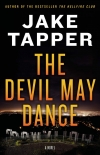The Devil May Dance by Jake Tapper (books to read fiction txt) 📗

- Author: Jake Tapper
Book online «The Devil May Dance by Jake Tapper (books to read fiction txt) 📗». Author Jake Tapper
Charlie and his fellow congressmen promised the lieutenant they would protect his name. Who knew what a Pentagon willing to hatch and carry out such deranged orders might do to a leaker? And what the lieutenant didn’t know was that he was not the first officer to tread outside his chain of command. Charlie had previously received an anonymous letter detailing the CIA’s Operation Dirty Trick, a plan to blame the Cubans if anything had gone wrong with the Mercury orbit the month before. A different source told them about Operation Good Times, which would spread throughout Cuba a fake photo of “an obese Castro with two beauties in any situation desired” next to a “table brimming over with the most delectable Cuban food with an underlying caption (appropriately Cuban) such as ‘My ration is different.’”
After several years on the Oversight Committee, through the Eisenhower and now Kennedy administrations, Charlie had reached many disappointing conclusions about the wisdom and even the emotional stability of those tasked with keeping the United States safe, mostly those at the CIA, run by men to the manor born, boola-boola Brahmins with no sense of humility. The worst of these unaccountable operatives was the one known as “the most brilliant man in Washington,” Richard Bissell—he of Groton, Yale, the Skull and Bones, the Marshall Plan, and the Ford Foundation—the agency’s deputy director for plans ever since the man who’d recruited him for the job, Frank Wisner, had had a mental breakdown in ’58.
Charlie first met Bissell in a closed-door hearing after his much-heralded high-altitude U-2 spy-plane program, which had been collecting reams of data through its illegal flights over the USSR, was ignominiously exposed after one of its planes was shot down over Sverdlovsk and its pilot captured. This happened literally days before President Eisenhower and Premier Khrushchev had been set to meet in Paris to discuss possible nuclear disarmament and a test ban. Eisenhower ultimately was forced to admit the United States had been spying on the USSR. Behind closed doors to the House Oversight subcommittee, Bissell demonstrated no contrition, no repentance, nothing indicating that he accepted responsibility for actions that had put the nation at greater risk.
Bissell next appeared before Charlie after the April 1961 Bay of Pigs disaster. The attitude, again, was pure hubris. Under questioning by Charlie, Bissell revealed that he’d feared that sharing a candid assessment of everything that might go wrong could frighten President Kennedy and keep him from taking any action, which he could not allow to happen. Again, he took no responsibility for the fiasco, the loss of life, or the embarrassment the president felt.
Charlie had spent a great deal of his time in Washington, DC, feeling staggeringly dismayed at the sad state of intellect in the nation’s capital. It wasn’t that they weren’t smart, the Eisenhower and Kennedy administration officials, congressional leaders, and members of the military-industrial complex Ike had warned everyone about in his farewell address. It was that they thought they were smarter than they were. They came up with plans that were so convoluted that if they backfired, they caused repercussions that lasted for years and only grew in their destructiveness. And here we had CIA officers and generals—the goddamn chairman of the Joint Chiefs of Staff—
“Charlie.” Lawford interrupted Charlie’s furious train of thought. “Do you watch The Twilight Zone?”
“Sure,” said Charlie. “Rod Serling’s a genius.”
“A few months ago they had this episode where this kid, I think his name was Anthony, had terrifying powers and could just wish people into the cornfields or transform them into horrific creatures. Did you see it?”
Charlie had. “Yeah. Creepy. Everyone’s afraid of the kid so the family turns into a bunch of sycophants. ‘It’s good you’re making it snow. A real good thing!’”
“Yeah,” said Lawford. “Exactly.” He shifted uncomfortably in his seat. Charlie was about to ask why he’d brought up the episode, but then he understood. They pulled into Sinatra’s Rancho Mirage estate.
They knocked on the door, and George Jacobs opened it while pouring from a shaker into two martini glasses. Despite the festive greeting he was offering, his tone was grim: “The boss has a cold,” he warned them.
“Oh, that’s too bad,” Charlie said, wondering what that might mean in terms of Sinatra’s mood.
“How bad?” Lawford asked. “His pipes clogged?”
“He’s worried about his ability to perform,” Jacobs said. “At the Oscars.”
“Hoo-boy,” said Lawford as they walked into the house.
Sinatra was sitting on the sofa in pajamas and a bathrobe, drinking a bourbon on the rocks. “Gentlemen, to what do I owe this honor?”
Charlie looked at Lawford awkwardly but Sinatra changed the subject before they had to confront their task.
“You went to the Globes, right?” Sinatra asked Lawford. “I heard Marilyn could barely walk.” The Hollywood Foreign Press Association had given Monroe and Charlton Heston their top awards a few weeks before.
“She was not in good shape,” Lawford agreed as he sat in a plush armchair across from Sinatra.
“‘Town Without Pity’ won,” Sinatra said, referring to the Best Original Song winner. “That and ‘Moon River’ are going to be tough to beat.”
“I’ve got my eye on some of the Globes’ ‘New Star of the Year’ girlies,” Lawford said. “Jane Fonda. And that Ann-Margret!”
“You and me both, pally,” Sinatra said, toasting his friend.
“Warren Beatty got one of those awards too,” Lawford said. “The kid is quite a swordsman.”
“That whole evening is ridiculous,” Sinatra said. “Foreign Press Association. It’s like five guys wearing fezzes—no one even knows if they write for actual papers.”
“Nothing





Comments (0)